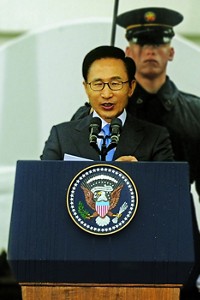Advertisement
Grab your lab coat. Let's get started
Welcome!
Welcome!
Create an account below to get 6 C&EN articles per month, receive newsletters and more - all free.
It seems this is your first time logging in online. Please enter the following information to continue.
As an ACS member you automatically get access to this site. All we need is few more details to create your reading experience.
Not you? Sign in with a different account.
Not you? Sign in with a different account.
ERROR 1
ERROR 1
ERROR 2
ERROR 2
ERROR 2
ERROR 2
ERROR 2
Password and Confirm password must match.
If you have an ACS member number, please enter it here so we can link this account to your membership. (optional)
ERROR 2
ACS values your privacy. By submitting your information, you are gaining access to C&EN and subscribing to our weekly newsletter. We use the information you provide to make your reading experience better, and we will never sell your data to third party members.
Policy
Industry Applauds Korean Trade Deal
Trade is as an area of potential collaboration between Obama and empowered Republicans
by Glenn Hess
January 24, 2011
| A version of this story appeared in
Volume 89, Issue 4

Chemical manufacturers and other U.S. businesses will press Congress to approve a long-stalled free-trade agreement with South Korea early this year. But some powerful labor unions are lining up against the pact, despite new provisions negotiated by the Obama Administration to protect American jobs.
The U.S.-South Korea Free Trade Agreement has been stuck in legislative limbo since 2007 when it was signed by former president George W. Bush. Democrats have blocked consideration of the proposed deal, arguing it did not go far enough in dismantling South Korea’s nontariff barriers, particularly in the automotive sector.
President Barack Obama—who sharply criticized the original accord when he campaigned for the White House in 2008—first announced plans to revive the South Korea trade pact last June, a few months after setting a goal of doubling U.S. exports over the next five years in hopes of spurring job growth.
Following six months of talks with Seoul, the Administration succeeded in removing the main stumbling block by persuading South Korea to open its market to more U.S. auto exports (C&EN, Dec. 13, 2010, page 10). In remarks at the White House on Dec. 3, Obama said the revised agreement “includes several important improvements and achieves what I believe trade deals must do. It’s a win-win for both countries.”
There are significant economic and strategic issues behind the agreement. From the American perspective, South Korea is a major export market where the U.S. wants to widen the door for products and services that create jobs at home. For South Korea, establishing closer economic relations with the U.S. will help boost a security relationship with its biggest ally.
The wide-ranging trade agreement will increase U.S. exports to South Korea by as much as $11 billion per year and support at least 70,000 American jobs, according to the White House.
Currently, U.S. exports to South Korea face an average tariff of 11.2%, while the equivalent U.S. tariff on South Korean exports is 3.7%. The agreement will level the playing field, as nearly 95% of all bilateral trade in consumer and industrial products will become duty-free within five years.
Two-way trade between South Korea and the U.S. totaled $67.8 billion in 2009, down sharply from $84.7 billion in 2008 as global commerce suffered during the economic downturn. But U.S. exports to South Korea, which totaled $28.6 billion in 2009, jumped to $32.2 billion in the first 10 months of 2010, up 39% from the same period a year earlier, according to the Commerce Department’s International Trade Administration (ITA).
The accord would be the largest for the U.S. since the North American Free Trade Agreement (NAFTA) with Mexico and Canada was ratified by Congress in 1993. South Korea is the U.S.’s seventh-largest trading partner, ranking ahead of larger economies such as France, Italy, and India.
Obama said the agreement with South Korea shows that the U.S. is ready to finalize more market-opening deals. Business leaders are eager to also move two other long-delayed trade pacts, with Colombia and Panama, through Congress.
“I’m especially pleased that this agreement includes groundbreaking protections for workers’ rights and for the environment. In this sense, it’s an example of the kind of fair-trade agreement that I’ll continue to work for as President, in Asia and around the world,” Obama said.
Chemical industry officials have welcomed the breakthrough in trade talks with South Korea. “We applaud both governments for their efforts to remove the remaining impediments to approval of the agreement,” says Andrew N. Liveris, chairman and chief executive officer of Dow Chemical, the largest U.S. chemical maker by revenue.
KEY POINTS OF THE PACT
The U.S.-South Korea Free Trade Agreement would provide the following:
• Eliminate tariffs on more than 95% of industrial and consumer goods within five years of entry into force; remaining tariffs would be eliminated within 10 years.
• Establish new rules on how South Korea will develop regulations applied to U.S. exports and require stronger protection and enforcement of intellectual property rights.
• Increase investment opportunities for U.S. companies in South Korea by providing them access to the market and a way for investors to enforce their rights.
• Include obligations for South Korea to respect fundamental workers' rights and to effectively enforce high standards to protect the environment.
SOURCE: White House fact sheet
The agreement will result in more than $1 million in tariff reductions for the company’s U.S.-manufactured exports to South Korea, according to the company.
The deal will also provide more than $6.5 million per year in duty reductions for Dow’s South Korean customers, according to Wan-Je Kim, manager at Dow Chemical Korea Ltd. “These duty savings validate the commercial advantage of business ties between South Korea and the U.S. and open up the potential of increased sales based on the market access commitments provided in the agreement,” Kim remarks.
“This is a major milestone in helping the U.S. regain sustainable economic strength,” adds Dow Corning Chairman and CEO Stephanie A. Burns. Korea is an important market for the company’s silicones and silicon-based materials.
“This agreement demonstrates the Administration’s willingness and commitment to opening new markets for American goods, boosting our exports, and leveling the playing field for American workers,” says Burns, a member of the President’s Export Council, a committee that advises Obama on international trade strategies.
Exporters of chemicals and related products, including pharmaceuticals, cosmetics, fertilizers, and agrochemicals, will particularly benefit from the agreement’s tariff reductions. According to ITA, 51% of U.S. chemical exports by value will receive duty-free treatment as soon as the pact enters into force, with the remaining tariffs phased out within a decade. Current South Korean chemical tariffs average 6% and can be as high as 50%.
“Our members view the South Korea free-trade agreement as the most commercially significant of the three pacts that have been negotiated and are awaiting votes in Congress,” says Justine Freisleben, manager of government relations at the Society of Chemical Manufacturers & Affiliates, a trade group that lobbies on behalf of nearly 300 small and medium-sized U.S. specialty and batch chemical producers. “It represents a huge market for them.”
As global trade plunged in 2009 amid the worst recession in 60 years, the U.S. shipped $4.4 billion worth of chemical products to South Korea, down from nearly $5 billion in 2008. But in 2010, South Korea resumed its position as one of the fastest-growing Asian markets for U.S. chemical manufacturers. The latest ITA data show that through October 2010, U.S. chemical exports to Korea totaled $4.9 billion, up almost 40% from the same period in 2009.
South Korea is also an important market for U.S.-based pharmaceutical companies. IMS Health, a market research firm, says the Asian nation is the fastest-growing developed market for medicines in the world. Despite the recession, U.S. exports of pharmaceuticals and medicines to South Korea jumped from $435 million in 2008 to $579 million in 2009, a 33% increase. The rapid growth continued last year, with U.S. pharma exports to South Korea rising to $624 million during the first 10 months of 2010, a 45% increase over the comparable period of a year earlier.
The free-trade agreement is a “terrific opportunity for South Korean patents to access biopharmaceutical medicines produced in the U.S.,” says John J. Castellani, president and CEO of the Pharmaceutical Research & Manufacturers of America, a trade group representing the brand-name drug industry. “This agreement will contribute directly to increased U.S. exports and the expansion of highly skilled, well-paying jobs here.”
Although the United Auto Workers union agreed to support the deal after negotiators took steps to address South Korea’s big trade surplus in automobiles, the AFL-CIO, the nation’s largest labor federation, and the United Steelworkers are urging lawmakers to reject the agreement. Their opposition could complicate efforts to get the support of organized labor’s Democratic backers in Congress.
AFL-CIO President Richard L. Trumka says the revised deal reached still does not do enough to allay concerns about the outsourcing of American jobs and the enforcement of tariff provisions. “We’ve seen U.S. multinational companies take advantage of the investment and other corporate protections in past trade deals to shift production offshore while maintaining access to the U.S. consumer market and undermining the jobs, wages, and bargaining power of American workers,” Trumka says.
Other skeptics of recent free-trade agreements also oppose the agreement. Lori M. Wallach, director of Public Citizen’s Global Trade Watch, notes that during the 2008 presidential campaign, Obama endorsed an alternative “fair-trade model” that protects U.S. jobs and workers’ rights and the environment around the world.
“Choosing to advance Bush’s NAFTA-style South Korea free-trade agreement rather than the new trade policy President Obama promised during his campaign will mean more American job loss and puts the White House at odds with the majority of Americans who, polling shows, oppose more of the same job-offshoring agreements,” Wallach says.
But business groups have pledged to help the Administration round up votes for the South Korean trade deal in Congress. “We benefit from a more open trading environment,” says Calvin M. Dooley, president and CEO of the American Chemistry Council, a trade group that lobbies on behalf of the nation’s biggest chemical companies. “So we hope that we will be part of the coalition that tries to ensure passage once the agreement is presented to Congress,” Dooley tells C&EN.
Industry officials also want the Administration to get behind the free-trade agreement with Colombia and the smaller deal with Panama, both of which have been bottled up in Congress since 2007, largely due to opposition by organized labor.
Chemical manufacturers are particularly interested in the pact with Colombia, the second most populous country in South America after Brazil. U.S. chemical exports to Colombia totaled $1.9 billion during the first 10 months of 2010, up 25% from the same period in 2009.
Republicans are demanding final action on all of the pending trade deals. “I feel like the President is getting serious about an ambitious trade agenda, and he will find a very willing and eager partner in House Republicans,” Rep. Kevin P. Brady (R-Texas), chairman of the House Ways & Means trade subcommittee, told the U.S. Chamber of Commerce in a speech in Washington, D.C., last month. “There’s no better way to show the rest of the world that America is serious about trade engagement than moving those free-trade agreements.”




Join the conversation
Contact the reporter
Submit a Letter to the Editor for publication
Engage with us on Twitter